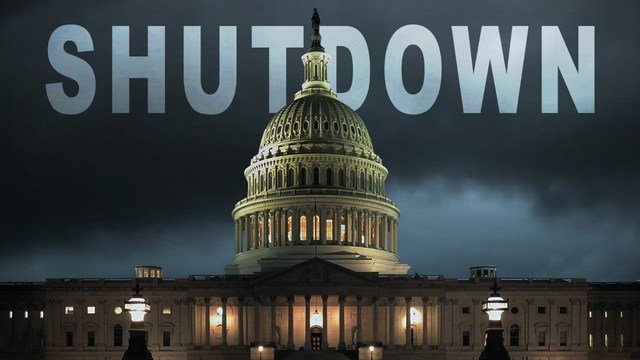
The government close down for three days. How did Wall Street respond? With a major yawn and shoulder shrug.
Stocks were level Monday morning however ticked higher on the news that the Senate achieved an arrangement to revive the legislature.
The arrangement would reestablish subsidizing just through February 8, yet regardless of whether the legislature close down once more, financial specialists shouldn't expect another auction.
This was the eighteenth government shutdown since 1976 - not really standard, but rather not strange region, either.
Would you like to take a think about what the market did amid the past 17 shutdowns? A ton of nothing.
As indicated by information gathered by Ryan Detrick, senior market strategist of LPL Financial, the middle change for the S&P 500 amid shutdown periods is zero.
Nada. Nothing.
Obviously, any extensive shutdown would affect numerous administration workers. Be that as it may, it is probably not going to imprint the general economy or the share trading system.
"In spite of the fact that an administration shutdown sounds unnerving, actually it has been a non-occasion generally for values," Detrick wrote in a blog entry in December - just before Congress passed a transient spending bargain that fought off a shutdown toward the finish of a year ago.
Undoubtedly, a few of the shutdowns were amazingly short. Eight occurred amid President Ronald Reagan's two terms in office, and they kept going only 15 days consolidated. Four of the Reagan-time shutdowns were for one day as it were.
The absence of any real market response to shutdowns in the course of recent years demonstrates that Wall Street thinks more about profit and the economy than it does legislative issues.
The few noteworthy organizations that have detailed their final quarter comes about so far - top banks like JPMorgan Chase (JPM) and Citigroup (C), guarantor UnitedHealth (UNH) and Delta Air Lines (DAL) - inspired financial specialists with their profit and viewpoints.
The economy is murmuring along, developing at a pace of over 3% in the second and third quarters. Market analysts are foreseeing that development will approach that level again when final quarter numbers are accounted for Friday.
Consider that the last time the legislature close down, for 16 days in September and October 2013, the S&P 500 went up 3.1%.
The economy at that point, as now, was fit as a fiddle. Monetary development ascended at a 2.6% pace in the final quarter of 2013, drove by a 3.3% hop in shopper spending. National government spending dove 12.8%, however that didn't keep down the genuine economy.
Stocks additionally ascended amid the two shutdowns when Bill Clinton was president - another period when the market and more extensive economy were going solid.
At the point when the market didn't do well amid a shutdown, the reason was indeed the economy. Stocks fell over 3% amid the 1976 shutdown while Gerald Ford was president.
Also, they were down no less than 2% amid three of the five shutdowns amid Jimmy Carter's organization.
However, the mid-to-late 1970s was a horrible period for America's economy. High joblessness. Rising loan fees. Surging oil costs. What's more, stagflation - the dreadful blend of stale monetary development and taking off swelling.
None of those dangers are available today. That is the reason Wall Street didn't give much idea to this present end of the week's shutdown and most likely won't sweat excessively if the legislature does this again in fourteen days.
"Speculators will in all likelihood disregard the shutdown, similarly as they have overlooked all political and geo-political news in the course of recent months," Hank Smith, co-boss venture officer at Haverford Trust, said in an email.
Smith included that, if the market sells off, "it will be welcomed as a purchasing opportunity in a market that has needed instability."
in conclusion the government only comes to put the complicated things I think